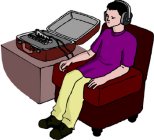
Worksheets and No Prep Teaching Resources
Reading Comprehension Worksheets
Health Professionals

Health Professionals
 Worksheets and No Prep Teaching Resources Reading Comprehension Worksheets Health Professionals |
 Health Professionals |
| edHelper's suggested reading level: | grades 4 to 6 | |
| Flesch-Kincaid grade level: | 9.08 |
|
Music Therapists
By Jennifer Kenny |

|
 1 When you think of health care professionals, you probably think of doctors and nurses. You might even think of dentists or chiropractors. Did you ever think to include music therapists? It may seem a little unusual, but music therapists are included in the category of health professionals.
1 When you think of health care professionals, you probably think of doctors and nurses. You might even think of dentists or chiropractors. Did you ever think to include music therapists? It may seem a little unusual, but music therapists are included in the category of health professionals. |
Create Weekly Reading Books
Prepare for an entire week at once! |
| Leave your feedback on Music Therapists (use this link if you found an error in the story) |
 |
Health Professionals
|